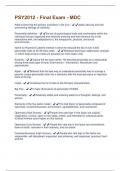PSY2012 - Final Exam - MDC
Adler's belief that the primary motivation in life is to - ✔️✔️obtain security and and
overcoming feelings of inferiority
Personality definition - ✔️✔️the set of psychological traits and mechanisms within the
individual that are organized and relatively enduring and that influence his or her
interactions with, and adaptations to, the intrapsychic, physical, and social
environments.
Name for Raymond Cattell's method in which he reduced the list of over 4.500
personality traits to 30-35 basic traits. - ✔️✔️Statistical technique called factor analysis.
-in which large arrays of data are grouped into more basic units
Eysenck - ✔️✔️reduce the list even further. He describe personality as a relationship
among three basic type of traits: Extroversion - Introversion, Neuroticism and
psychoticism
Alport - ✔️✔️Believed that the best way to understand personality was to arrange a
persons unique personality traits into a hierarchy with the most pervasive or important
traits at the top.
Catell - ✔️✔️Condense the lis of traits to 30=35 basic characteristics.
Big Five - ✔️✔️5 major dimensions of personality OCEAN.
Personality - ✔️✔️Relatively stable and enduring patterns of thoughts, feelings, and
actions
Elements of the five-factor model - ✔️✔️The trait theory of personality composed of
openness, conscientiousness, extroversion, agreeableness, and neuroticism
Openness (High Scores) - ✔️✔️People who rate high in this factor are original,
imaginative, curious, open to new ideas, artistic, and interested in cultural pursuits.
(Critical thinkers score higher on this factors)
Openness (Low Scores) - ✔️✔️People who rate low in this factor are conventional,
down-to-earth, narrower in their interests, and not artistic
Conscientiousness (High Scores) - ✔️✔️People who rate high in this factor are
responsible, self-disciplined, organized, and achieving, well organized, punctual, hard-
workind
, Conscientiousness (Low Scores) - ✔️✔️People who rate low in this factor are careless,
negligent, Lazy, disorganized, Late, impulsive, undependable of others
Extroversion (High Scores) - ✔️✔️People who rate high in this factor are joiner,
talkative, active, affectionate, sociable, outgoing, fun loving,
Extroversion (Low Scores) - ✔️✔️People who rate low in this factor are Withdrawn,
quiet, passive, reserved, loner, quiet, passive
Agreeable (High Scores) - ✔️✔️People who rate high in this factor are good-natured,
warm, gentle, cooperative, trusting, helpful, lenient, soft-hearted
Agreeable (Low Scores) - ✔️✔️People who rate low in this factor are argumentative,
ruthless, suspicious, uncooperative, vindictive, critical, irritable
Neuroticism (High Scores) - ✔️✔️People who rate high in this factor are Worried,
temperamental, self-consciuos, emotionally unstable, prone to insecurities, anxiety guilt,
worry, moodiness.
Neuroticism (Low Scores) - ✔️✔️People who rate low in this factor are emotionally
stable, calm, even tempered, easygoing, relaxed, comfortable
Id - ✔️✔️Innate, biological instincts and urges. It is immature, impulsive, and irrational.
It is totally unconscious and serves as the reservoir of mental energy.
Pleasure principle - ✔️✔️Seeks immediate gratification to relieve the tension (id)
Ego - ✔️✔️Plans the problem solving, reasoning and controlling the potentially
destructive energy of the id.
Reality principle - ✔️✔️Delaying gratification when necessary - understand and deal
with objects and events in the real world (Ego)
Superego - ✔️✔️Set of ethical rules for behavior. Develops from internalized parental
and societal standards.
Morality principle - ✔️✔️Violating its rule results of guilt, Constantly strive for perfection
and is therefore unrealistic (superego)
Defense mechanism of repression - ✔️✔️The mechanism by which the ego prevents
the most unacceptable, anxiety- provoking, thoughts from entering consciousness
Alfred Adler (Neo-freudian) - ✔️✔️We are motivated by our goals in life




